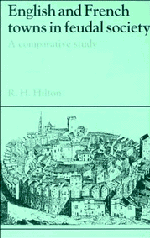Conclusion
Published online by Cambridge University Press: 03 May 2011
Summary
I have attempted in this book to study various aspects of English and French towns during the middle ages as necessary features of the feudal society in which they existed. In so doing, I have not accepted interpretations of the medieval town which over-emphasise its rural nature, almost obliterating the distinction between town and country. The undoubted presence, within even quite large towns, of garden plots, vineyards, perhaps some arable and meadowland, not to speak of some inhabitants who were peasants and agricultural workers, is partly responsible for this view. But if occupational heterogeneity is accepted as one of the main determining features of an urban entity, with cultivators absent or constituting only a minority of the town's population, then the importance of the urban component of medieval society must be recognised, even from the earliest post-Roman period onwards.
It follows that one should beware of assimilating the medieval town or city into agrarian feudalism. The argument of this book started from the view that feudal society was not essentially based on a ‘natural economy’ in which everybody, from aristocratic landowners to peasants, produced their own means of subsistence, whether from the demesne or from rent in labour or kind, in the case of the landowner, or from their family holding, in the case of the peasants.
- Type
- Chapter
- Information
- English and French Towns in Feudal SocietyA Comparative Study, pp. 152 - 154Publisher: Cambridge University PressPrint publication year: 1992



